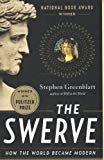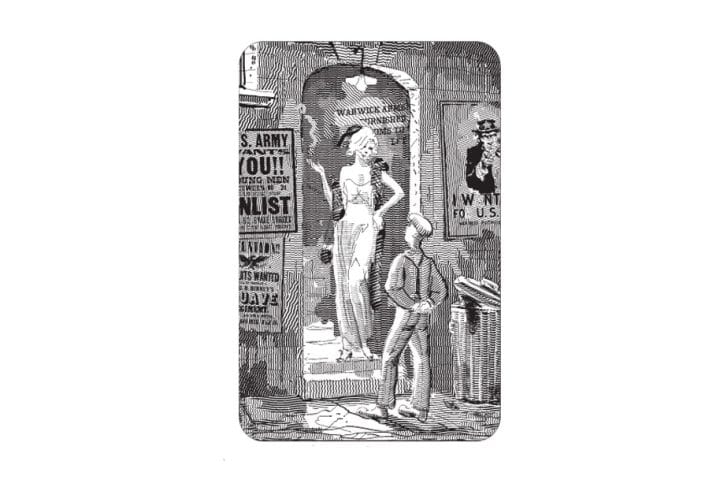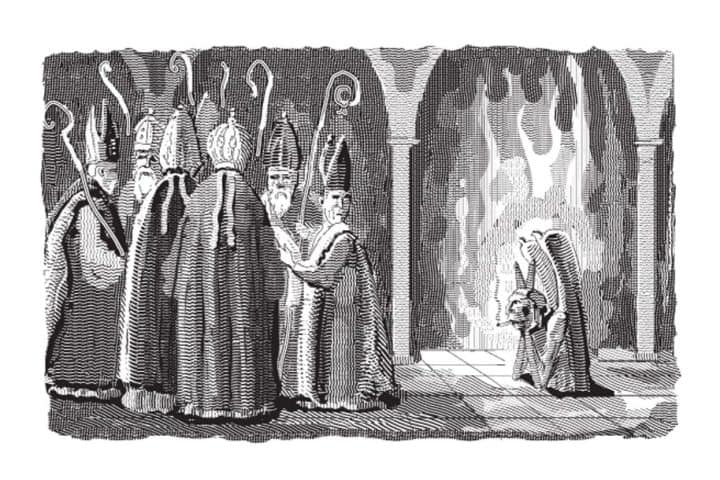Books Reviewed
A review of The Swerve: How the World Became Modern, by Stephen Greenblatt
In 1417 the Renaissance humanist Poggio Bracciolini discovered, in the library of a monastery in Germany, a 9th-century manuscript of Lucretius' poem De rerum natura, "On the Nature of Things." This poem, the most complete exposition of Epicureanism to come down from antiquity, had been altogether lost for many centuries. In The Swerve's artfully structured narrative, Harvard literary scholar Stephen Greenblatt presents an engaging account of how this discovery happened. His book is enriched by vivid depictions of intellectual and social worlds, including Lucretius' Rome, early Christian life, Renaissance humanism, and the papal court. It culminates in reflections on how the rediscovered Epicurean teaching shaped modern thought.
The Epicurean doctrine rests on an atomic physics, the basic notions of which had been developed by the pre-Socratic philosopher Democritus. The fundamental, permanent constituent elements of the whole in this view are infinite empty space and infinite numbers of atoms, whose random jostlings and conjoinings bring into being all things that exist. Modern science believes in atoms too, of course, but also in sub-atomic particles and forces. In the ancient view, by contrast, nothing is smaller or more fundamental than atoms, which cannot be divided, destroyed, or changed. Atoms themselves, along with the emptiness of space and the totality of the universe, are the only eternal beings. All other things, including our world as a whole, are mortal.
"The swerve" of Greenblatt's title refers to a notorious doctrine of Epicurean physics, which provoked no small amount of ridicule from other philosophers in antiquity. Atoms falling downward (at equal speed in empty space) would remain in parallel motion without ever colliding and causing things to be formed. To explain the existence of the actual world rather than a universe of eternally distinct atoms, the Epicureans had to posit a tiny random deviation from that absolutely straight motion. They also thought this uncaused, random swerve explained how free will can overcome inexorable determination by natural forces.
Greenblatt uses the term "swerve" to evoke, as well, the role of pure chance or randomness in human affairs—as affecting, in particular, which works of ancient literature survive the malice of time and which are (the far greater number) lost forever. He tells the tale of the mid-18th century discovery of charred manuscripts in the Villa of the Papyri in Herculaneum, including works of the Epicurean philosopher Philodemus, a contemporary of Lucretius. (A manuscript of the De rerum natura itself was found there much more recently.)
Speculating on life in a luxurious villa with a library of philosophic works, Greenblatt characterizes that historical moment as "the culmination of a lengthy process that braided together Greek and Roman high culture." He reminds us that ancient philosophy did not consist of purely individual speculation, but of philosophic conversation and argumentation among friends, as we find in some of Cicero's philosophic dialogues. This quality finds expression in the Epicurean conception of philosophic friendship and is nicely exemplified by Cicero, whose philosophical works criticize Epicureanism as a doctrine harmful to morality and politics but whose closest friend, Atticus, was an Epicurean.
* * *
Of antiquity's several philosophies, Epicureanism seems the one least compatible with Christianity. Although Epicureanism does not explicitly deny the existence of gods, it does assert that immortal beings would enjoy the highest good, pleasure, without any admixture of pain or worries. They would neither care for us nor be present in our world, wherein nothing can be immortal. Gods, then, would exist only in some spaces between worlds. But since Lucretius also asserts that large storms of matter—perhaps fire, perhaps water—must eventually fall from the infinitude of space upon our world so as to destroy it, it seems impossible to give a convincing account of how immortal gods could exist anywhere. Cicero suggested that Epicureans are, in fact, atheists who avoid that charge's perils by professing belief in gods who do nothing of relevance to human beings.
Furthermore, Epicureans unambiguously deny any immortality of individual human souls: after death each of us is nothing, and death is nothing to us. Accordingly, the good toward which Epicureanism directs us is pleasure in this life, the only one we'll ever have. Greenblatt elaborates how deeply opposed all this is to Christianity, not least to the mortification of the flesh. "A hatred of pleasure-seeking and a vision of God's providential rage: these were death knells of Epicureanism, henceforward branded by the faithful as ‘insane.'"
The Swerve powerfully evokes the Renaissance humanists' excitement at the rediscovery of ancient writings. Greenblatt shows us how extraordinary it was for prominent thinkers of one age to seek and welcome rediscovery of cultural products from other, very different eras. The De rerum natura fascinated many in spite of—and some because of—the sharp opposition between Lucretius and everything Christian. Renaissance authors needed to avoid agreeing with these heretical teachings, of course. Thus, after Lorenzo Valla wrote a dialogue in which Epicurean doctrines—especially the praise of pleasure—are celebrated, Bracciolini attacked him for countenancing these anti-Christian doctrines. Valla's defense, following a tradition going back at least to Cicero, was that he did not endorse these doctrines. Rather, one character endorsed them in the course of a dialogue that concludes with unanimous agreement on a Christian standpoint, a literary strategy Greenblatt labels "dialogical disavowal."
* * *
Presenting a view of the world profoundly incompatible with the Christian-Aristotelian synthesis, Lucretius helped engender the scientific, philosophical, and ethical thinking we commonly call modern. Greenblatt notes that Machiavelli copied the entire poem, Montaigne was deeply influenced by it, Galileo shared important agreements with Lucretius, and Descartes's contemporary Pierre Gassendi expounded Epicurean doctrines, which he sought to reconcile with Christianity. At the same time, one wonders how best to think about the differences between Epicureanism and modernity. Freeing us from fears of the gods and the afterlife, Lucretius invites us to contemplate and accept the true nature of things. Modern philosophy, by contrast, aims at transforming our world for the satisfaction of all men here and now. One suspects that the difference arises from the moderns' confronting a different kind of religious alternative to philosophy (namely, Christianity) than did the ancient Epicureans in the pagan world.
The De rerum natura's poetic form facilitated another way for Epicureanism to be propagated in a world officially and thoroughly opposed to it. Several humanists argued that, although Lucretius' thought is misguided and heretical, his poetic achievement deserves our earnest attention. Lucretius himself had addressed the relationship of his poetry to the true doctrines of Epicurus he set to verse. In a famous passage, he compares his poetry to a doctor's application of honey to the rim of a cup of bitter medicine administered to a sick child. The child is indeed deceived, but in no way exploited, since the medicine will eventually restore his health. With the charm of poetry, Lucretius hopes to entice his reader. Any bitterness in the teachings will be evident only later, after the reader has begun to benefit from true doctrines.
Greenblatt suggests that Lucretius sells short his poetry—deep, powerful, and sublime—by emphasizing its sweetness. But Lucretius is in fact claiming a great deal for it. He must understand fully the structure and passions of the human soul in order to identify obstacles to accepting the truth, and he must know how to overcome these obstacles. Among the most powerful are religion's imaginary terrors about the afterlife, and desires inflamed by imagining beyond what is pleasant by nature. Our vain terrors, unreasonable hopes, and excessive desires immiserate us, but his philosophically guided poetry claims to be able to prevail over them.
* * *
Greenblatt's account of the power of Lucretius' poetry emphasizes the famous invocation of Venus, with which the whole work begins: "[W]hile we are alive," comments Greenblatt, "we should be filled with the deepest pleasure, for we are a small part of a vast process of world-making that Lucretius celebrated as essentially erotic." But the Roman eventually makes clear that the processes of creation are equally balanced with those of destruction; our metaphorical mother the earth is also our tomb; life-promoting atoms teem in it, along with those that cause illness and death. Our world as a whole will, some day, be given over to total destruction. The poem ends with a stirring depiction of the plague at Athens. Philosophy, which on one occasion Lucretius identifies with true piety, does not only admire the life-giving forces at work in the world, but is the capacity to look upon all things with a mind at peace.
The most powerful impression from The Swerve is the excitement and urgency with which Renaissance humanists sought to rediscover ancient ways of thought and expression. Greenblatt's autobiographical preface, recounting his own youthful encounter with Lucretius, shows us that such experiences of recovery can still provide the deepest intellectual stimulation and joy.
* * *
For Correspondence on this review, click here.






